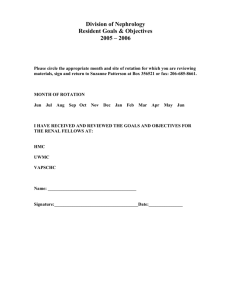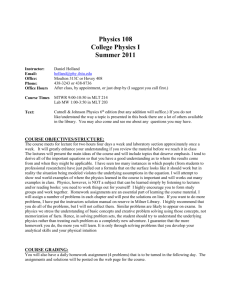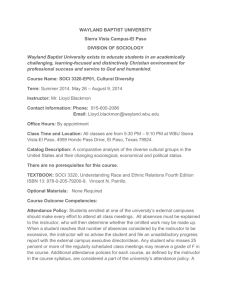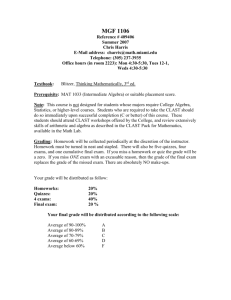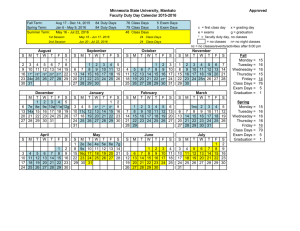ChBE 2100 Chemical Process Principles
advertisement
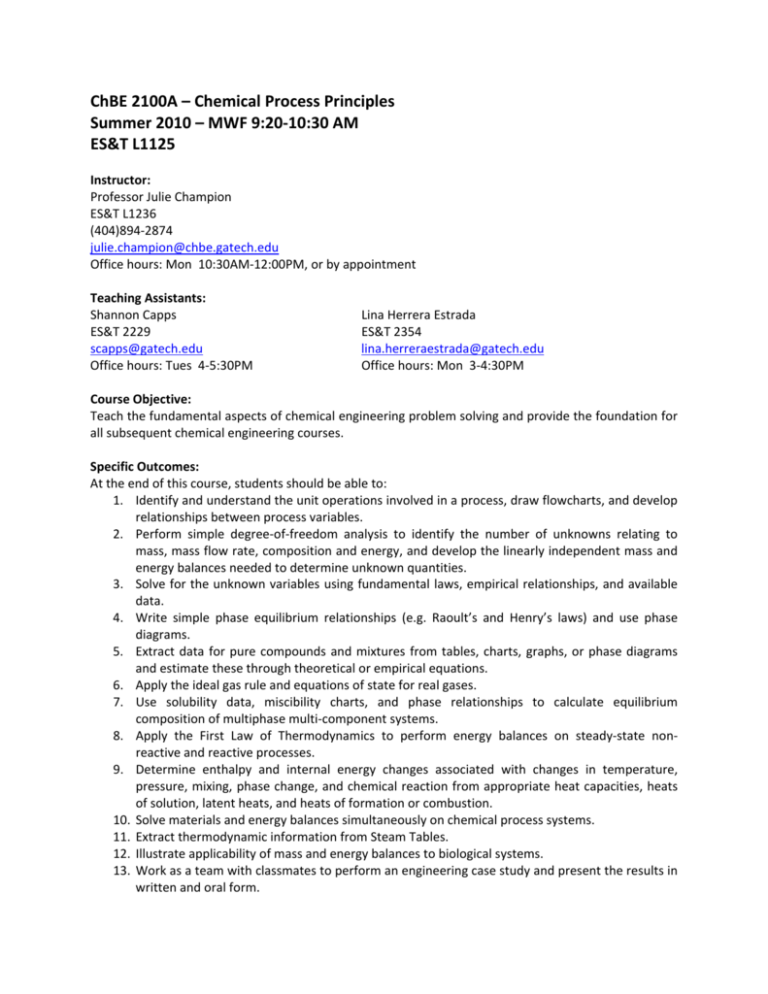
ChBE 2100A – Chemical Process Principles Summer 2010 – MWF 9:20‐10:30 AM ES&T L1125 Instructor: Professor Julie Champion ES&T L1236 (404)894‐2874 julie.champion@chbe.gatech.edu Office hours: Mon 10:30AM‐12:00PM, or by appointment Teaching Assistants: Shannon Capps Lina Herrera Estrada ES&T 2229 ES&T 2354 lina.herreraestrada@gatech.edu scapps@gatech.edu Office hours: Tues 4‐5:30PM Office hours: Mon 3‐4:30PM Course Objective: Teach the fundamental aspects of chemical engineering problem solving and provide the foundation for all subsequent chemical engineering courses. Specific Outcomes: At the end of this course, students should be able to: 1. Identify and understand the unit operations involved in a process, draw flowcharts, and develop relationships between process variables. 2. Perform simple degree‐of‐freedom analysis to identify the number of unknowns relating to mass, mass flow rate, composition and energy, and develop the linearly independent mass and energy balances needed to determine unknown quantities. 3. Solve for the unknown variables using fundamental laws, empirical relationships, and available data. 4. Write simple phase equilibrium relationships (e.g. Raoult’s and Henry’s laws) and use phase diagrams. 5. Extract data for pure compounds and mixtures from tables, charts, graphs, or phase diagrams and estimate these through theoretical or empirical equations. 6. Apply the ideal gas rule and equations of state for real gases. 7. Use solubility data, miscibility charts, and phase relationships to calculate equilibrium composition of multiphase multi‐component systems. 8. Apply the First Law of Thermodynamics to perform energy balances on steady‐state non‐ reactive and reactive processes. 9. Determine enthalpy and internal energy changes associated with changes in temperature, pressure, mixing, phase change, and chemical reaction from appropriate heat capacities, heats of solution, latent heats, and heats of formation or combustion. 10. Solve materials and energy balances simultaneously on chemical process systems. 11. Extract thermodynamic information from Steam Tables. 12. Illustrate applicability of mass and energy balances to biological systems. 13. Work as a team with classmates to perform an engineering case study and present the results in written and oral form. Prerequisites: Chem 1310 (General Chemistry), Math 1502 (Calculus II) Text: Felder & Rousseau, Elementary Principles of Chemical Processes, John Wiley & Sons, Inc., 3rd Edition. Complete reading before each lecture for best results. “Test Yourself” and examples are very useful to make sure you understand the material. Web: Course material, homework assignments, announcements and grades will be posted on T‐square (http://www.t‐square.gatech.edu). Check the website regularly. Grading Scheme: Homework 12% A 90‐100% Quizzes 8% B 80‐90% Group Project 15% C 70‐80% Exams 45% D 60‐70% Final Exam 20% F 0‐60% The ranges above indicate the minimum grade received. Demonstrating improvement over the semester and frequent class participation may increase the letter grade of borderline averages. Homework: Homework is due in class at 9:25 AM. Late assignments will not be accepted unless arranged in advance with the instructor. Solutions will be posted on the website. Working with others is allowed and encouraged but each student must write up and turn in their own work (see Honor Code). Homework copied from classmates or the solution manual will receive a score of 0. Take advantage of instructor and TA office hours for questions with homework or class material after you have attempted the problems on your own. Homework must be formatted as below. Professional presentation of results is a critical skill in the real world. Failure to format properly will automatically reduce the max score to 80%. • Use plain, lined or graph paper with straight edges, no notebook “fringe” or scrap paper. White, yellow or green paper is fine. • On the first page in the upper right hand corner write: Name, ChBE 2100A, due date and homework set #. • Number all pages (1/5, 2/5, etc.) in the upper right hand corner. • Staple all pages together in the upper left hand corner. • Clearly label each problem number and part (1a, 1b, 1c etc.). • Briefly define the problem and list critical information. A labeled process diagram is often sufficient. Do not recopy the problem statement, it is a waste of time. • List all assumptions made, reference additional information used (steam tables, etc.) and show all work performed to obtain the solution. Box the solution (with appropriate significant figures). • Print neatly in pencil. • For problems using Excel or Matlab, make sure all values and graphs are clearly labeled. Print your spreadsheet or m‐file and attach it to your homework. Quizzes: Four short, in‐class pop quizzes will be given to assess understanding in between exams. Quizzes will be closed book, closed notes and will not require a calculator. To allow for unavoidable absences, the lowest quiz score can be dropped. Group Project: Students will be divided into groups for a case study that applies mass and energy balances to a biological system. Collaboration and teamwork are important components of this project. Oral and written presentation of results will be required. More details will be provided in June. Exams: Three cumulative exams and a final exam will be given during the semester. They will be administered during class. Please notify the instructor immediately if you have a conflict. Make‐up exams will only be allowed in extreme emergency. Call or email the instructor as soon as the emergency is known. Medical emergencies that delay exams, quizzes, or homework must be accompanied by a note from the health center. All exams are closed book. One 8.5”x11” sheet of personal notes is permitted and may not be copied from other students. Necessary numerical constants, physical properties and conversion factors will be given on exams. Scientific or graphing calculators are allowed in exams but wireless devices are forbidden. Re‐grade requests must be submitted in writing within 1 week of exam return and should explain why the grade is in question. Be aware that the entire exam will be re‐graded, not just the problem in question. Honor Code: Students are expected to follow the Georgia Tech Honor Code at all times. http://www.honor.gatech.edu Copying from other students (current or former), instructor/TA solutions from previous semesters, solution manuals, web sites or any other form of word is considered an honor code violation. Please see the instructor if you have any questions. Advice: This course is different from any other you have taken. It is about learning how to solve problems, not memorizing reactions or plugging new numbers into the same old equation. Problem solving takes time and practice. There are no substitutes for these. A good rule of thumb is to spend 3 hours outside of class reading and practicing problems for every 1 hour in class. Homework or exam studying started at midnight the night before will not turn out well. This is not a threat, just what I have observed. The amount of time and effort to get an A or B in organic chemistry or calculus is not the same as this course. The methods you learn in 2100 will be used over and over in every ChBE class until you graduate – this is why it is so important to practice and learn it now before it gets harder. Tenative Course Schedule ‐‐ ChBE 2100C Lecture 1 2 3 4 5 6 7 8 9 10 11 12 13 14 15 16 17 18 19 20 21 22 23 24 25 26 27 28 29 Day M W F M W F M W F M W F M W F M W F M W F M W F M W F M W F M W F Tu Date Reading 17‐May Ch 1, 2 & 3 19‐May Ch 4.0‐4.3 21‐May Ch 4.4 24‐May Ch 4.5 26‐May Ch 4.6 28‐May Ch. 4.7 31‐May 2‐Jun Ch. 4.8‐4.10 4‐Jun 7‐Jun Ch 1‐4 9‐Jun Ch 5.0‐5.5 11‐Jun Ch 6.0‐6.3 14‐Jun Ch 6.4 16‐Jun Ch 6.5‐6.6 18‐Jun Ch 6.6‐6.7 21‐Jun Ch 7.0‐7.3 23‐Jun 25‐Jun Ch 1‐6 28‐Jun Ch 7.4‐7.8 30‐Jun Ch 8.0‐8.4 2‐Jul Ch 8.4 5‐Jul 7‐Jul Ch 8.5‐8.6 9‐Jul Ch 9.0‐9.3 12‐Jul Ch 1‐8 14‐Jul Ch 9.4 16‐Jul Ch 9.5 19‐Jul Ch 9.6‐9.7 21‐Jul Ch 11.0‐11.2 23‐Jul 26‐Jul Ch 11.3 28‐Jul Ch 11.4‐11.5 30‐Jul 3‐Aug Ch 1‐9, 11 Homework Due HW 1 HW 2 HW 3 HW 4 HW 5 Project memo HW 6 HW 7 HW 8 HW 9 Written report HW 10 HW 11 Topic Engineering calculations, process variables Material balances Material balances, multiple unit processes Recycle and bypass Reactive processes Balances on reactive processes NO CLASS ‐‐ Memorial Day Combustion reactions Catch‐up/review Exam 1 Physical properties, ideal & non‐ideal gases Phase equilibrium, gas‐liquid, Project Multicomponent gas liquid Solid liquid, liquid‐liquid Liquid‐liquid, adsorption on solids 1st law of thermo, Energy balances closed Catch‐up/review Exam 2 Energy balances open Heat capacity, latent heats, phase changes Psychrometric charts, adiabatic cooling NO CLASS ‐‐4th of July holiday Heats of mixing and solution Heats of reaction and formation Exam 3 Heats of combustion Energy balances on reactive processes Fuels and combustion Transient mass balances Group presentations Transient energy balances Trans processes Review FINAL EXAM 11:30 AM ‐2:20 PM
